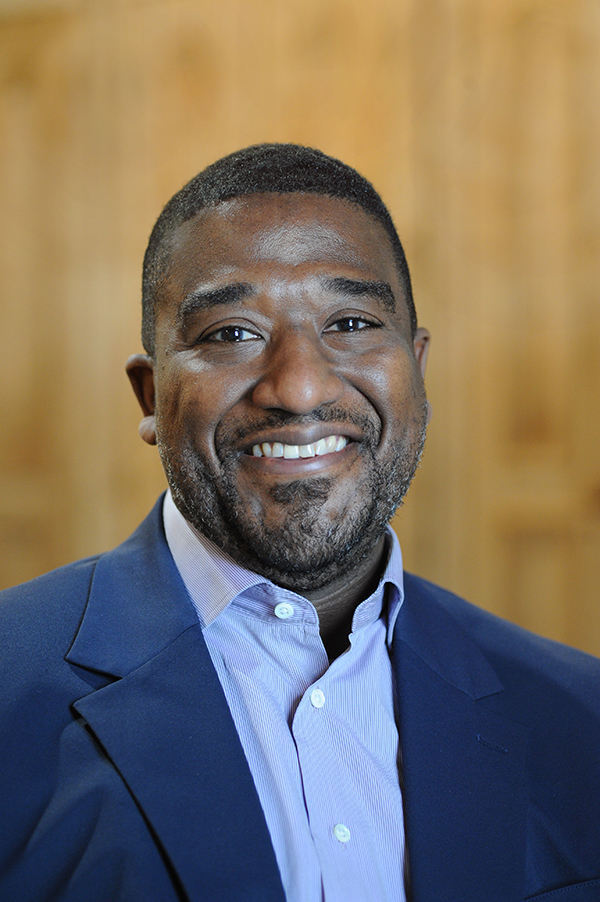Q&A with advisory board member Philip Charles-Pierre
September 27, 2022 | Mauri Connors
 IAH advisory board member Philip Charles-Pierre received his B.A. in international affairs and philosophy from UNC-Chapel Hill in 1995 and has a master’s degree in the philosophy of religion from Harvard University.
IAH advisory board member Philip Charles-Pierre received his B.A. in international affairs and philosophy from UNC-Chapel Hill in 1995 and has a master’s degree in the philosophy of religion from Harvard University.
Today, he is the CEO and co-founder of Semsee, a technology platform that connects insurance agents with carriers to make the commercial insurance sales process more effective and efficient. Prior to Semsee, he was Senior Vice President of Distribution for Smarter Agent, and has worked at Site59, Travelocity and Starwood Hotels building B2B platforms. At Carolina, he is a former member of the UNC Board of Visitors member and is currently an advisory board member for the Sonja Haynes Stone Center for Black Culture and History.
Q: What was one of the most impactful moments for you with a professor as an undergraduate?
A: There were so many, but one of the most impactful was during my senior year when two of my professors came to me and said, “I hear you’re going to law school; we think you should get a Ph.D. in philosophy or religion.” And I believe they came independently to tell me that. I eventually applied to divinity schools, where you could study the philosophy of religion. Upon getting accepted, I decided to go to Harvard. But had they not come to me, I think I would likely be an unhappy lawyer today.
Studying international studies and philosophy allowed me to understand the world in a different way, not just in terms of proximity but how we are all interconnected, through economics to politics. But the ability to learn through the humanities with an international lens and then reflect on what happens here in America was very impactful and is important in broadening horizons.
Q: How has your time at Carolina contributed to your success?
A: Coming from New York and an all-boys Catholic school, and with my parents being of Haitian descent, the experience at Carolina broadened my horizons. In New York, I was very used to seeing many different people from different parts of the world, but Carolina gave me a really interesting perspective on Americana and the South, and the various complexities that brings – but also the joy and the beauty.
Ultimately, maybe the most important thing is the relationships, both with this institution that I cherish, but also the incredibly deep relationships I have with people I met at Carolina. From my fraternity brothers to my roommate, I would not be the same without them.
Q: How have the arts and humanities shaped your life or career?
A: One of the things I value, whether in the business world or the political world, is intellectual nimbleness. It means being a really good listener, which I think the humanities helps you to become. The humanities teach you how to listen, which questions to ask, and how to listen to the answers to get a fuller, deeper understanding of things. This ultimately leads people to be much more intellectually nimble, which I think is really important in life.
Q: Why do you feel it’s important to support the Institute for the Arts and Humanities?
A: I think the arts and humanities are unsung heroes of the university. They provide a deep awareness of so many different things to students and to faculty. The IAH allows them to be their best selves, through its fellowships and in its work uplifting those in the arts and humanities. That work, by extension, makes these unsung heroes even better. I’m very glad to have been a student in the arts and humanities. Society is better off with lots of folks who have studied a myriad of very different things. I’ve gone from business to politics to nonprofits to startups and it has not been a hindrance that I didn’t go to business school or to law school. I think the humanities equally prepared me for them all. I think it’s been a plus.
Q: What are you excited for in the upcoming year as an incoming External Advisory Board Member?
A: I think the advisory board has an incredibly legacy, from its foundation, its principles, and the people who are involved. And I’m excited to be involved as the Institute works to stand on that legacy and leverage it, while evolving within the university, our society, and our country. This will be fascinating, important, and difficult work, but if all of us are born out of the arts and humanities, we’ll be able to have a lot of impact. In fact, learning from the arts and humanities will have prepared us to help shape and reshape the Institute as well as the faculty and staff that we support.
Q: What’s a good book you’ve read recently?
A: The Obstacle Is the Way is the last book I read. It’s born out of the study of stoicism in ancient Greece and takes that philosophy into the modern day. I really enjoyed the book because I’ve always really enjoyed stoicism, as a way of being, and enjoyed understanding how it can be applied to our modern world.
Q&A by Mauri Connors, and edited for length and clarity. This interview originally appeared in our Annual Highlights issue for 2021-2022.
Categories: Featured News Content, Impact, News

